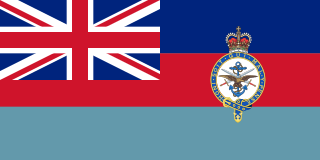 W
WThe Chief of the Defence Staff (CDS) is the professional head of the British Armed Forces and the most senior uniformed military adviser to the Secretary of State for Defence and the Prime Minister of the United Kingdom. The Chief of the Defence Staff is based at the Ministry of Defence and works alongside the Permanent Under Secretary, the ministry's senior civil servant. The Chief of the Defence Staff is the British equivalent position of what in NATO and the European Union is known as the Chief of Defence.
 W
WAdmiral of the Fleet Sir Edward Beckwith Ashmore, was a senior Royal Navy officer. He saw active service in the Second World War and later commanded two frigates before achieving high command in the Navy. He served as First Sea Lord and Chief of the Naval Staff in the mid-1970s and in that role he advised the incoming Labour government on a major defence review and on the implications of the Turkish invasion of Cyprus. He went on to be Chief of the Defence Staff, serving briefly in a caretaker capacity following the death of his predecessor.
 W
WAdmiral of the Fleet Michael Cecil Boyce, Baron Boyce, is a retired Royal Navy officer who now sits as a crossbench member of the House of Lords.
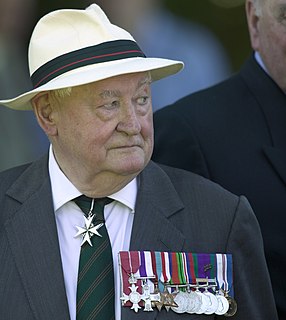 W
WField Marshal Edwin Noel Westby Bramall, Baron Bramall, was a British Army officer. He was Chief of the General Staff, the professional head of the British Army, between 1979 and 1982, and as Chief of the Defence Staff, professional head of the British Armed Forces, from 1982 to 1985.
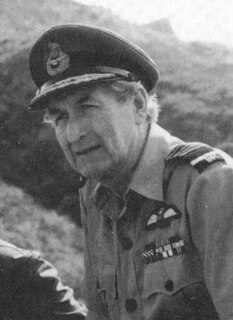 W
WMarshal of the Royal Air Force Neil Cameron, Baron Cameron of Balhousie, was a senior officer in the Royal Air Force. He fought in the Second World War as a fighter pilot taking part in the Battle of Britain, the Battle of Alam el Halfa, the First Battle of El Alamein and the Second Battle of El Alamein and then in operations in Burma. He served as Chief of the Air Staff in the late 1970s advising the British Government on the reinforcement of the British garrison in Belize which was under threat from Guatemala at the time. He also served as the Chief of the Defence Staff at the end of the 1970s in which role he secured pay comparability for services personnel involved in civil support during the firemen's strike, visited the People's Republic of China and lectured extensively on the Soviet air threat.
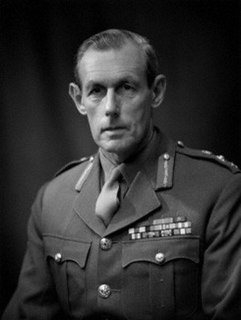 W
WField Marshal Richard Michael Power Carver, Baron Carver, was a senior British Army officer. Lord Carver served as the Chief of the General Staff (CGS), the professional head of the British Army, and then as the Chief of the Defence Staff (CDS), the professional head of the British Armed Forces. He served during the Second World War and organised the administration of British forces deployed in response to the Mau Mau Uprising in Kenya and later in his career provided advice to the British government on the response to the early stages of The Troubles in Northern Ireland.
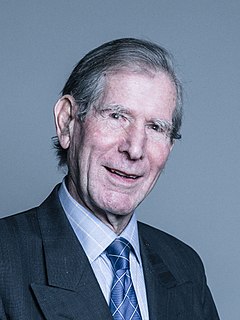 W
WMarshal of the Royal Air Force David Brownrigg Craig, Baron Craig of Radley, is a retired Royal Air Force officer and member of the House of Lords. He was a fast jet pilot in the 1950s, a squadron commander in the 1960s and a station commander in the 1970s. He served as Chief of the Air Staff during the late 1980s, when the Boeing Airborne early warning and control system was ordered and the European Fighter programme was being developed. He then served as Chief of the Defence Staff during the Gulf War. He was granted a life peerage as Baron Craig of Radley after his retirement from active service in 1991, sitting as a crossbencher.
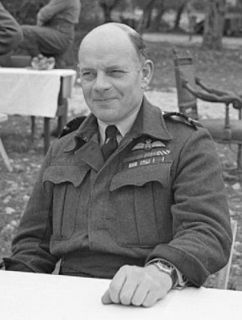 W
WMarshal of the Royal Air Force Sir William Forster Dickson, was a Royal Naval Air Service aviator during the First World War, a senior officer in the Royal Air Force during the inter-war years and a Royal Air Force commander during and after the Second World War. Dickson was Chief of the Air Staff in the mid-1950s, in which role his main preoccupation was the establishment of the V Force and the necessary supporting weapons, airfields and personnel. He also served as the first Chief of the Defence Staff in the late 1950s.
 W
WMarshal of the Royal Air Force Samuel Charles Elworthy, Baron Elworthy, was a senior officer in the Royal Air Force. He served as commander of a squadron of Blenheim bombers and then as a station commander during the Second World War. He became Chief of the Air Staff in the mid-1960s and implemented the cancellation of the TSR-2 strike aircraft and the HS681 military transport aircraft programmes. He also became Chief of the Defence Staff in which role he oversaw the evacuation from Aden in November 1967 and had to respond to the growing crisis in Northern Ireland in the late 1960s.
 W
WAdmiral of the Fleet John David Elliott Fieldhouse, Baron Fieldhouse, was a Royal Navy officer. He commanded five submarines and a frigate before achieving higher command from the 1970s. Following the invasion of the Falkland Islands by Argentine forces in April 1982, Fieldhouse was appointed Commander of the Task Force given responsibility for "Operation Corporate", the mission to recover the Falkland Islands. The campaign ended in the surrender of Argentine forces in June 1982. He became First Sea Lord and Chief of Naval Staff in December that year and, in that role, persuaded the British Government to fund the replacement of ships lost in the Falklands War. He went on to be Chief of the Defence Staff from 1985 until his retirement in 1988.
 W
WField Marshal Charles Ronald Llewelyn Guthrie, Baron Guthrie of Craigiebank, is a retired senior officer of the British Army who served as Chief of the General Staff from 1994 to 1997 and Chief of the Defence Staff from 1997 until his retirement in 2001.
 W
WMarshal of the Royal Air Force Sir Peter Robin Harding, is a retired Royal Air Force officer who served as a bomber pilot in the 1950s, a helicopter squadron commander in the 1960s and a station commander in the 1970s. He became Chief of the Air Staff in 1988 and served in that role during the Gulf War in 1991. He became Chief of the Defence Staff in December 1992 but resigned after his affair with Lady (Bienvenida) Buck, the wife of Conservative MP Antony Buck, became public.
 W
WAdmiral of the Fleet Peter John Hill-Norton, Baron Hill-Norton, was a senior Royal Navy officer. He fought in the Second World War as gunnery officer in a cruiser operating on the Western Approaches and in the North Sea taking part in the Norwegian Campaign, then in a cruiser taking part in the Arctic convoys and finally in a battleship operating in the Eastern Fleet. After the War he commanded a destroyer and then an aircraft carrier. He served as First Sea Lord and Chief of the Naval Staff and then Chief of the Defence Staff in early 1970s. In the latter role he gave the final commitment to Project Chevaline, the Polaris missile improvement programme. He went on to be Chairman of the NATO Military Committee.
 W
WField Marshal Sir Richard Amyatt Hull, was a senior British Army officer. He was the last Chief of the Imperial General Staff (1961–64) and the first Chief of the General Staff (1964–65), and, as such, the professional head of the British Army. He later became Chief of the Defence Staff (1965–67), the professional head of the entire British Armed Forces. He served with distinction during the Second World War, fighting from 1942 to 1945 in North Africa, Italy and Western Europe, became the youngest divisional commander in the British Army, and later advised the British government on the response to the Indonesia–Malaysia confrontation.
 W
WMarshal of the Royal Air Force Sir Andrew Henry Humphrey, was a senior officer in the Royal Air Force. He fought in the Second World War as a fighter pilot taking part in the Battle of Britain and also took part in the withdrawal from Aden in November 1967. He served as the Chief of the Air Staff advising the new Labour Government on the implementation of their latest Defence Review. He then served as Chief of the Defence Staff but caught pneumonia within three months of taking office and died shortly afterwards.
Field Marshal Peter Anthony Inge, Baron Inge,, was the Chief of the General Staff, the professional head of the British Army, from 1992 to 1994. He then served as Chief of the Defence Staff before retiring in 1997. Early in his military career he saw action during the Malayan Emergency and in Northern Ireland and later in his career he provided advice to the British Government during the Bosnian War.
 W
WAdmiral of the Fleet Terence Thornton Lewin, Baron Lewin, was a Royal Navy officer. He served in the Second World War and then commanded a destroyer, the Royal yacht, two frigates and an aircraft carrier before achieving higher command. He was First Sea Lord and Chief of the Naval Staff in the late 1970s and in that role he worked hard to secure a decent wage for servicemen and helped win them a 32% pay rise. He went on to be Chief of the Defence Staff during the Falklands War, serving as chief war planner and as Prime Minister Margaret Thatcher's chief advisor during the war. He was also the first Chief of Defence Staff to act as head of the Armed Forces rather than just Chairman of the Chiefs of Staff Committee.
 W
WAdmiral of the Fleet Louis Francis Albert Victor Nicholas Mountbatten, 1st Earl Mountbatten of Burma, was a British Royal Navy officer and statesman, an uncle of Prince Philip, Duke of Edinburgh, and second cousin once removed of Queen Elizabeth II. During the Second World War, he was Supreme Allied Commander, South East Asia Command. He was the last Viceroy of India and the first governor-general of independent India.
 W
WGeneral David Julian Richards, Baron Richards of Herstmonceux, is a retired senior British Army officer who was formerly the Chief of the Defence Staff, the professional head of the British Armed Forces. He succeeded Air Chief Marshal Sir Jock Stirrup in this role on 29 October 2010.
 W
WMarshal of the Royal Air Force Graham Eric Stirrup, Baron Stirrup,, informally known as Jock Stirrup, is a former senior Royal Air Force commander who was the Chief of the Defence Staff from 2006 until his retirement in late 2010. He is now a Crossbench member of the House of Lords. In April 2013, he was appointed a Knight of the Order of the Garter by Queen Elizabeth II.
 W
WField Marshal Richard Frederick Vincent, Baron Vincent of Coleshill, was a British Army officer. After serving with British Army of the Rhine he served with the Commonwealth Brigade in Malaysia during the Indonesia–Malaysia confrontation. He commanded 12th Light Air Defence Regiment in Northern Ireland during the Troubles, for which he was awarded the Distinguished Service Order, and later commanded 19th Airportable Brigade. Although he never served as one of the individual service heads, he went on to be Vice-Chief of the Defence Staff in the late 1980s and then Chief of the Defence Staff in the aftermath of the Gulf War. He subsequently became Chair of the Military Committee of NATO in the mid-1990s.
 W
WField Marshal Michael John Dawson Walker, Baron Walker of Aldringham, is a retired British Army officer. Commissioned in 1966, he served in Cyprus, Northern Ireland, and in a variety of staff posts in the United Kingdom until 1984. After being given command of a battalion, he was mentioned in despatches for his service during a second tour of duty in Northern Ireland, this time in Derry, and subsequently served a tour on Gibraltar. He was promoted to brigadier, unusually having never held the rank of colonel, and took command of 20th Armoured Brigade in Germany before becoming I Corps chief of staff.